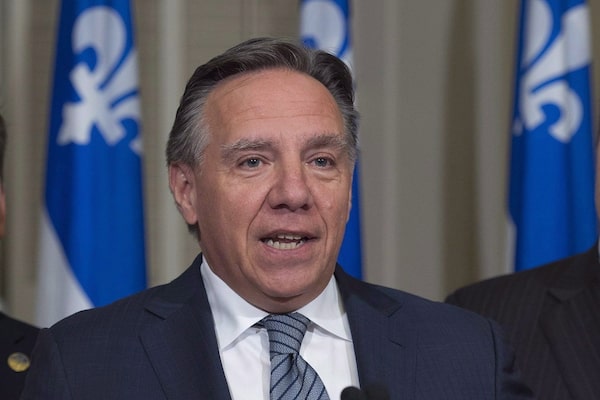
Quebec Premier François Legault, seen here in October, 2016, and the Coalition Avenir Québec government tabled legislation last year to bring in a PR system.Jacques Boissinot/The Canadian Press
Bringing about the end of Canada’s first-past-the-post voting system has long been a source of frustration for electoral reformers. British Columbia, Ontario and Prince Edward Island have all held referendums on switching to some form of proportional representation (PR), yet voters stuck with the status quo every time.
Canadians have yet to show an appetite for changing an electoral system that, despite its flaws, can at least claim a long history of stable governance.
But now Quebec is taking its shot. Premier François Legault and the Coalition Avenir Québec government tabled legislation last year to bring in a PR system. The government intends to hold a referendum on the plan at the same time as the next provincial general election, in October, 2022.
There is one rule to remember when it comes to proposals to reform Canada’s electoral system: Pay attention to the benefits accruing to the party doing the proposing.
A notable example was Prime Minister Justin Trudeau’s promise to make the 2015 general election the last federal vote to be held under first-past-the-post.
His proffered alternative was a ballot system in which voters ranked their preferences in order. The choice was a self-serving gambit: New Democratic Party voters and Conservative voters could both be counted on to make the centrist Liberals their second choice.
When opposition to the idea mounted, Mr. Trudeau declared that there was no appetite for reform (nor even for a different form of PR?) and broke his election promise.
The Liberals had also no doubt noticed that the 2015 election had delivered them a strong majority with just 39.5 per cent of the popular vote. That’s a typical outcome for multi-party elections under first-past-the-post, in which the candidate who receives the most votes in each riding claims the seat in the House of Commons.
First-past-the-post emphasizes winning votes in specific places over winning a thin layer of votes everywhere, which is good for some parties and bad for others. The Liberals are in no hurry to eliminate it, as PR would make it much harder for them to win a majority, given that their party shares many of its voters with at least two other parties on the left at any given moment.
That math is also why New Democrats have a great interest in moving to proportional representation. The NDP won 16 per cent of the federal vote in 2019, but got only 7 per cent of the seats in the House of Commons – also a fairly typical outcome under first-past-the-post.
So what, then, is the CAQ’s calculation? Why is Mr. Legault prepared to end a system that, in 2018, gave his party 59 per cent of the seats in the National Assembly in exchange for 37.5 per cent of the popular vote?
Is he so altruistic as to abandon his newly won majority, as a simulation of his government’s proposed system indicated would have been the case had the system been in place in the 2018 election?
The CAQ’s plan would see the National Assembly split into 80 “division seats” and 45 “regional seats.” People would vote for one riding-level candidate, and also for a party’s list of candidates for the regional seats. After the election, the regional seats would be assigned based on the popular vote.
There appear to be two consequences of this proposal. One is that the island of Montreal, which contains most of the province’s anglophones and visible minorities, and is a bastion of federalist voters, would lose at least three seats in the National Assembly. That’s not the fault of PR; it’s simply a wrinkle in this plan. Those seats would go to regions where support for the CAQ’s ethnic nationalism is more reliable.
The other consequence of the plan is that it could decimate the Liberal Party of Quebec. As the sole federalist party lined up against at least three other parties leaning in the opposite direction, it would be unlikely to form government again.
So there you have it. Mr. Legault’s reform would lessen the representation from the province’s most diverse region, where many voters are federalist and anglophone, and ensure that the one party that most speaks for those voters is relegated to permanent rump status.
Proportional representation might offer benefits for Quebec voters, but in crafting this plan, Mr. Legault and his party have kept one eye firmly fixed on their own interests.